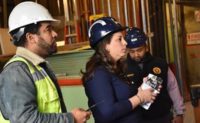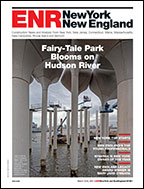Contractors are evaluating two major New York City subway tunneling projects in Manhattan that will be bid later this year. The contracts are part of New York’s most ambitious transportation expansion in decades through three major subway and rail projects.
One contract is for a 2-mi.-long leg of the Second Avenue Subway, a new line on Manhattan's East Side. The other is a shorter extension of an existing subway line that will link Times Square to the Far West Side. Combined estimated cost: $5.8 billion.
The winning bidder may well bear strong resemblance to the team that won a $428-million contract over the summer for the subway system’s other big Manhattan tunneling job, a 1-mi., four-tube dig for a new commuter rail extension. That contract is part of the $6.3-billion East Side Access program that will bring Long Island Rail Road trains to Manhattan's Grand Central Terminal for the first time.
That contract went to a joint venture of Dragados USA, a unit of Madrid-based ACS Group, and Judlau Contracting, a New York City contractor that handles its share of more routine work for the region’s transportation superagency, the Metropolitan Transportation Authority.
|
The successful bidders for the new work being offered will be required to build a 2-mi.-long subway segment and a 7,000-ft.-long extension. Both projects would require a 19-ft., 6-in. inside diameter, precast segmental binder tunnel, although an MTA official says the agency might consider cast-in-place concrete.
And both will require advanced boring techniques and equipment used in other parts of the world but seldom in New York. “You have these European contractors coming in and that’s a big challenge to the local contractors,” Mysore Nagaraja, president of MTA’s capital construction unit, told companies at an industry briefing Sept. 12 in New York City.
The $3.8-billion first leg of the Second Avenue Subway line and the $2 billion extension to the No. 7 will take expertise that might not be found in the five boroughs, Nagaraja says.
While the winning bid may well again be a combination of a local contractor and a European firm, Nagaraja says that the advanced level of work will raise the bar and encourage local players to get in the mix.
“That really will be the challenge to everybody to be more innovative,” he adds. “The local guys are now going to sharpen their pencils. It’s going to be a healthy type of competition that will ultimately benefit the public.”
The No. 7 contract is coming out later in the year and would cover running tunnels, caverns, and station structures in the extension that will stretch the existing line from its terminus at 42nd Street in Times Square to the Jacob K. Javits Convention Center on Manhattan’s Far West Side. The $900-million to $1-billion job will go out as a request for proposals rather than an invitation for low bids, says Philip McGrade, the MTA’s program manager for the project.
In a change to previous plans, the first contract has grown to incorporate all of the heavy civil structural work for the alignment. It will start with a shaft at 25th Street that will include the TBM assembly chamber and an area that will serve as future train storage.
The contractor would then tunnel northward along 11th Avenue, digging out a cavern for the 34th Street station at the convention center, then turn eastward at 41st Street as it heads toward Eighth Avenue. The project will cross under several Amtrak rail tunnels and the Lincoln Tunnel under the Hudson River joining Manhattan and New Jersey. The contract would include an option for the contractor to conduct the open-cut excavation for the box of a station at 10th Avenue and 41st Street.
“We’re assuming we can work 24 hours a day, seven days a week, though we do have to meet noise monitoring standards,” McGrade says in response to a question from the audience.
The project, which New York City is funding out of its own capital budget, also requires the city to finalize takings of several properties that would be used for stations and shafts along the route, a process that Nagaraja says is expected to be complete later this year.
The Second Avenue project would have two contracts going out. The CM-1338 RFP for construction management consultant services is one. The second is the C-26002 that will be a 37-month, low-bid contract for construction of Phase 1 of the line, which will run tunnels from a new 92nd Street station to the existing 63rd Street station on the line along which the F subway train runs.
The project would also include excavation for stations at 86th Street and 72nd Street, as well as tunnels stretching farther north to be used as storage capacity.
The No. 7 line is expected to open in 2012, while the first leg of the Second Avenue subway would open in 2013.
 Related Links:
Related Links: 


Post a comment to this article
Report Abusive Comment